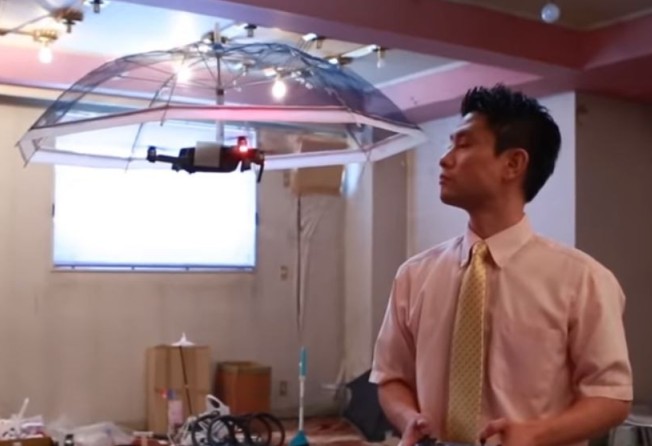Umbrella revolution: Japanese tech firm is using drones to build a hands-free brolly
Given Japan’s strict regulations on the use of drones, the maker also admits the devices may be initially limited to private property

A Japanese company is on the cusp of solving that age-old problem of never having enough hands to carry the shopping and unlock the car door because you are holding an umbrella to keep the rain off: a hybrid drone-umbrella that uses artificial intelligence to hover just above a user’s head.
Asahi Power Service is presently putting a series of drone-powered parasols through their paces at its research facility in Tochigi Prefecture, north of Tokyo, but also intends to produce waterproof umbrellas when the technology has been perfected.
The company’s Free Parasol takes its name from its hands-free operations and has a canopy that opens out to a width of 150cm. Beneath the canopy is the “brains” of the brolly, an AI device that can be programmed to lock onto and then follow the user’s head, providing permanent shade on the sunniest of days or keeping the rain off.
As an added bonus, they point out, the downwash from the device’s four propellers delivers a cooling breeze on the hottest days.
The company said its prototype weighs 5kg, a weight that presently limits its operating time to a mere 20 minutes on a single charge. The aim is to reduce that weight to 1kg and the ability to operate for up to 60 minutes without requiring recharging.
Asahi Power Service said it plans to release its smart umbrella in 2019, with units likely to cost around 30,000 yen (US$273) each.
It admits, however, there are still a number of hurdles to overcome, both environmental and regulatory. Tests are under way to determine how best to prevent Free Parasols being blown away in strong winds, for example.
Given Japan’s strict regulations on the use of drones, the maker also admits the devices may be initially limited to private property, such as golf courses, although it is possible that laws covering drones may be relaxed once the technology is proven.